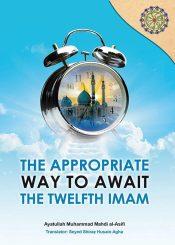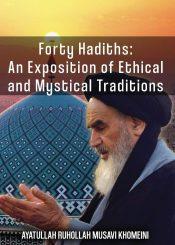Hadrat Fatimah Zahra (A.S.): "A Proof upon the Creation"
Hadrat Fatimah Zahra (A.S.): "A Proof upon the Creation"
0 Vote
482 View
The short lifetime of lady Fatima (A.S.) was not enough for her real rank to be revealed through her words and deeds that were based on the invisible world; this is why she was likened to the Night of Power in its hidden implications and rank. The words that were uttered by her father regarding her disclose some of her sublime rank as it is mentioned in the Guarded Tablet. We must keep in mind that those words were not said because of their family relation; which is consistent with the Quranic fact that the Prophet (S.A.W.) ‘does not speak out of his own fancy’. The Prophet purposely and on many occasions made clear Fatima’s rank among Muslims. If he intended to go on a trip, the last person he would bid farewell to was Fatima (A.S.) and when he came back she was the first person he would contact. Furthermore, he used to call her ‘her father’s mother'. We all know that the mother symbolizes sympathy and affection in man’s life. No wonder then that she became the haven in which the Prophet (S.A.W.) felt relieved and that is why she became ‘his soul that is in his heart’. Aysha, the Prophet’s wife, described Fatima’s relation with her father by saying, “No one ever resembled the Prophet in what he used to say and the way he talked like Fatima did! When she used to come to visit him he would greet her, kiss her hands and made her sit by his side”. On another occasion Aysha clearly stated, “The Prophet (S.A.W.) used to rise and go to her when she came to visit him”. Clearly, this expression differs from merely rising in honour of her in that the Prophet actually used to stand up and walk towards her in honour of and yearning for her; something he did not do with anyone of his contemporaries. The Prophet’s saying about Fatima, “Allah’s anger follows he anger and His pleasure follows her pleasure” should not be overlooked. This saying- unrestricted to a specific time and situation-indicates that everything Fatima (A.S.) used to say and do throughout her life stages was consistent with Allah’s will. This is why her actions served as a line that differentiated between rectitude and error, and this is the meaning of infallibility. The most wonderful word said by her descendants regarding her is the everlasting saying by Imam al-Hasan al-Askari (A.S.) describing her as ‘A Proof upon the creation’. How wonderful an expression this is! No wonder he said that if we realize that a proof is what we present before Allah. It is clear that her sayings are regarded as juristic evidence by all the followers of sharia including the infallible imams themselves. This is why the imams ascribed some of their knowledge to her through what she dictated to Imam Ali (A.S.) after her father’s demise. Among the practical lessons to learn from her lifestyle is her great emphasis on chastity for women in its strictest form. She became happy when the Prophet (S.A.W.) assigned housekeeping to her because it saved her the trouble of being in contact with men. She also became happy when Asma’ Bint Omays depicted to her the coffin that was to be put together for her in a way that would conceal her body despite the fact that her funeral was to take place in the middle of the night with only a small group of Imam Ali’s companions attending! Hadrat Fatimah Zahra (A.S.): "A Proof upon the Creation" The short lifetime of lady Fatima (A.S.) was not enough for her real rank to be revealed through her words and deeds that were based on the invisible world; this is why she was likened to the Night of Power in its hidden implications and rank. The words that were uttered by her father regarding her disclose some of her sublime rank as it is mentioned in the Guarded Tablet. We must keep in mind that those words were not said because of their family relation; which is consistent with the Quranic fact that the Prophet (S.A.W.) ‘does not speak out of his own fancy’. The Prophet purposely and on many occasions made clear Fatima’s rank among Muslims. If he intended to go on a trip, the last person he would bid farewell to was Fatima (A.S.) and when he came back she was the first person he would contact. Furthermore, he used to call her ‘her father’s mother'. We all know that the mother symbolizes sympathy and affection in man’s life. No wonder then that she became the haven in which the Prophet (S.A.W.) felt relieved and that is why she became ‘his soul that is in his heart’. Aysha, the Prophet’s wife, described Fatima’s relation with her father by saying, “No one ever resembled the Prophet in what he used to say and the way he talked like Fatima did! When she used to come to visit him he would greet her, kiss her hands and made her sit by his side”. On another occasion Aysha clearly stated, “The Prophet (S.A.W.) used to rise and go to her when she came to visit him”. Clearly, this expression differs from merely rising in honour of her in that the Prophet actually used to stand up and walk towards her in honour of and yearning for her; something he did not do with anyone of his contemporaries. The Prophet’s saying about Fatima, “Allah’s anger follows he anger and His pleasure follows her pleasure” should not be overlooked. This saying- unrestricted to a specific time and situation-indicates that everything Fatima (A.S.) used to say and do throughout her life stages was consistent with Allah’s will. This is why her actions served as a line that differentiated between rectitude and error, and this is the meaning of infallibility. The most wonderful word said by her descendants regarding her is the everlasting saying by Imam al-Hasan al-Askari (A.S.) describing her as ‘A Proof upon the creation’. How wonderful an expression this is! No wonder he said that if we realize that a proof is what we present before Allah. It is clear that her sayings are regarded as juristic evidence by all the followers of sharia including the infallible imams themselves. This is why the imams ascribed some of their knowledge to her through what she dictated to Imam Ali (A.S.) after her father’s demise. Among the practical lessons to learn from her lifestyle is her great emphasis on chastity for women in its strictest form. She became happy when the Prophet (S.A.W.) assigned housekeeping to her because it saved her the trouble of being in contact with men. She also became happy when Asma’ Bint Omays depicted to her the coffin that was to be put together for her in a way that would conceal her body despite the fact that her funeral was to take place in the middle of the night with only a small group of Imam Ali’s companions attending! Source: alhassanain.com






